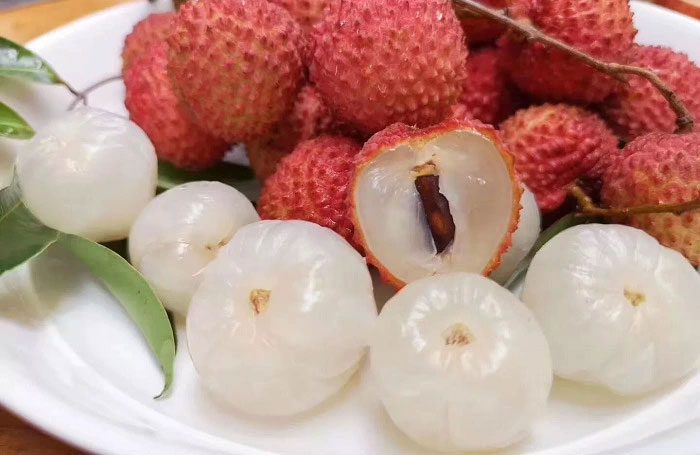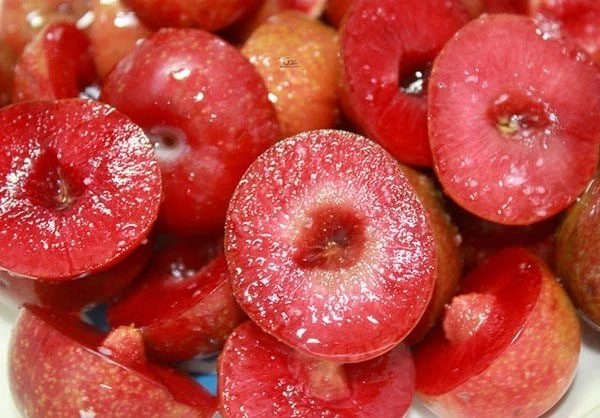Experts Advise Key Considerations When Eating Three Essential Fruits During the Duanwu Festival.
The 5th day of the 5th lunar month each year marks the Duanwu Festival, also known as the Insect Extermination Festival. On this day, people typically prepare a simple offering table for their ancestors, primarily featuring various fruits. Among these, lychee, plum, and mango are three common fruits seen on the Duanwu festival offering table.
It is believed that eating these fruits, which are considered to have “heating” properties, helps eliminate harmful insects that affect crops and agricultural production. According to Associate Professor Dr. Nguyen Thi Lam (former Deputy Director of the National Institute of Nutrition), these fruits are regarded as “heating” due to their high sugar content. Consuming them in excess can lead to a feeling of warmth in the body.
However, experts also advise several important considerations when consuming these three types of fruit.
1. Lychee
Associate Professor Dr. Nguyen Thi Lam notes that while lychee is delicious, it should not be consumed in large quantities. Overindulgence in lychee can lead to the formation of boils, as this fruit has the ability to generate heat and contains a significant amount of sugar.
Experts recommend limiting consumption to no more than 10 lychees for adults and 3-4 for children. It is advisable to eat the white membrane surrounding the lychee flesh, soak it in salt water before consumption, and pair it with lotus seeds or mung beans to mitigate its heating effects. This also helps prevent the occurrence of boils.

Pregnant women who want to eat lychee should consult a doctor due to its high sugar content, which can lead to gestational diabetes.
Additionally, certain groups of people, such as diabetes patients and those with chickenpox, should limit their lychee intake. This is because fresh lychee contains a high level of sugar, and excessive consumption can prevent the liver from fully metabolizing fructose, leading to abnormally high blood sugar levels.
Individuals with phlegm in their throat, those suffering from chickenpox, rashes, or styes should also avoid lychee, as it may exacerbate their condition. Pregnant women should consult their doctors before consuming lychee, as its sweetness can dangerously lead to gestational diabetes.
2. Plum
According to nutritionist Dr. Vu Dai Duong (based in Hanoi), consuming plums correctly can enhance collagen production and improve health. However, women should ensure they do not eat too many at once.
The reason is that excessive plum consumption can lead to boils and rashes, especially for those with a “hot” constitution. This fruit is high in acidity, which can deplete calcium, phosphorus, and protein in the body. Overeating plums is not beneficial for health.

Stomach patients eating plums on an empty stomach can be extremely dangerous.
Experts also advise against eating plums on an empty stomach. This habit can lead to persistent hunger pangs and discomfort, which can be harmful to the stomach. For stomach patients, consuming plums on an empty stomach is particularly dangerous.
Moreover, individuals with high blood sugar levels should avoid overripe plums. Overripe plums are very sweet, and for those with high blood sugar or diabetes, consuming them can dangerously spike blood sugar levels.
While plums are delicious and nutritious, certain groups should exercise caution. Specifically, young children and those with stomach issues should limit their plum intake. Individuals who have recently undergone surgery should also avoid plums, as they can hinder recovery. Those taking traditional herbal medicine should also refrain from eating plums, as it may cause adverse effects, especially if consumed in large quantities.
3. Mango
According to Associate Professor Dr. Nguyen Thi Lam, both green and ripe mangoes should be strictly avoided when hungry. This fruit has a distinct acidity, even when ripe. The acidity in mangoes stimulates the stomach, increasing gastric secretions, which can harm the stomach and increase the risk of gastrointestinal diseases. Eating mangoes on an empty stomach can also lead to nausea and temporary poisoning, so caution is essential.

Each person should only consume 200-250g of mango per day.
Do not consume a large amount of mango at once due to the risk of internal heat, leading to the development of boils and rashes. Overweight and obese individuals should also limit their mango intake. Each individual should only consume 200-250g of mango each day.
Experts advise that individuals with diarrhea should avoid mangoes. As mangoes are high in fiber, overconsumption during diarrhea can worsen the condition.
Additionally, those with allergic tendencies should be cautious. The urushiol in mangoes can cause contact dermatitis in susceptible individuals, leading to itching, inflammation, peeling, and blistering of the skin. You may also experience itching around the mouth, on the lips, tongue irritation, dry eyes, and hives.
In conclusion, fruits such as lychee, mango, and plum are indispensable during the Duanwu Festival. However, it is essential to be mindful of overconsumption regardless of the intent. Moreover, if you belong to any special groups, extra caution should be exercised to avoid health complications.



















































